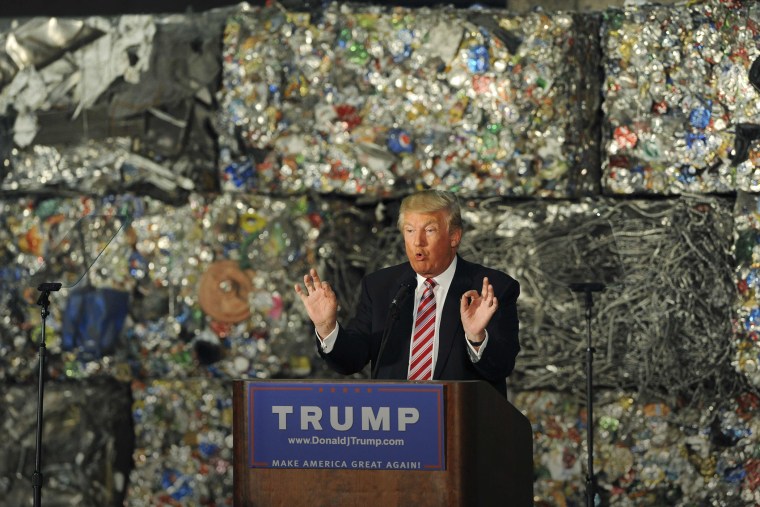If you put aside everything you know about Donald Trump, ignore everything in his platform, and simply read the text of today's speech as it exists on the page, you'd think the presumptive Republican nominee was offering little more than old-school protectionism.
Donald Trump told supporters it's time for the U.S. regain its "economic independence" and promised to reverse decades-worth of U.S. trade policies pushed by Hillary Clinton that he says have hurt workers. "We have become more dependent on foreign countries than ever before," Trump said Tuesday during a campaign stop in Pennsylvania. "Ladies and Gentlemen, it's time to declare our economic independence once again."
Trump blasted "globalization," the TPP, "financial elites," and "the people who rigged the system for their benefit. MSNBC's Benjy Sarlin noted that "a lot of this speech ... could be delivered by [Bernie] Sanders."
That's absolutely true. Sanders' speeches tend to be a lot more honest -- as usual, the fact-checkers had a field day with the GOP candidate, and he continues to lie almost uncontrollably about U.S. tax rates, among other things -- but the broader messages in Trump's remarks, read carefully from his trusty teleprompter, seemed designed to appeal to economic populists who were persuaded by the Vermont senator.
Even if we leave questions about the merits of trade and globalization for another day, there are two problems with Trump's pitch that shouldn't be overlooked.
The first is his jarring lack of credibility. To hear a billionaire land developer whine about "the people who rigged the system for their benefit" would be laughable if it weren't so ridiculous.
Trump expressed concern today for the millions of Americans workers who've been left with "nothing but poverty and heartache," overlooking the inconvenient detail that Trump enterprises have been striking one-sided deals that have hurt workers over and over again.
In the same speech, Trump lamented, "Skilled craftsmen and tradespeople and factory workers have seen the jobs they loved shipped thousands of miles away." The problem isn't that this is wrong, but rather, it's Trump who's been part of the job-shipping process, celebrating the purported virtues of outsourcing and foreign manufacturing.
The disconnect between Trump's rhetoric and Trump's record was so jarring, it's tempting to think someone put the wrong speech in the teleprompter and the Republican candidate just played along out of habit.
But let's say for the sake of conversation that Trump has seen the light. Let's say he's turned over a new leaf and he's now ready to stop looking out for himself and start looking out for working-class families. The outsourcer no longer likes outsourcing. The billionaire who exploited his workers now wants to be their champion. Trump is ready to run to Hillary Clinton's left on trade. Sure.
The broader problem, which far too much of the coverage overlooks, is Trump's actual economic agenda that serves as the basis for his campaign. Aside from his newfound concerns about trade, let's not forget that the New York Republican is pushing:
* Massive tax breaks for the hyper-wealthy;
* Deregulation for Wall Street;
* No minimum wage hike;
* The elimination of health care benefits for millions of struggling families.
Not to put too fine a point on this, but Donald J. Trump isn't running on a populist platform. Policy and substance still count, and the presumptive Republican nominee's vision combines Bernie Sanders' questions with Mitt Romney's answers.
To focus on the former, while ignoring the latter, is to see an incomplete picture.
